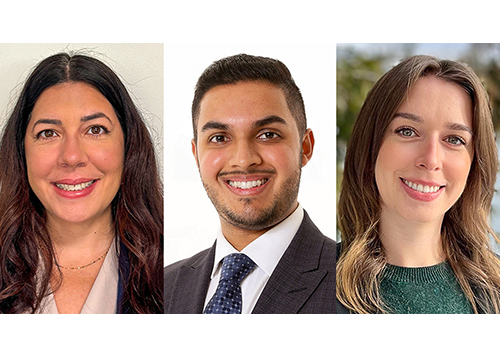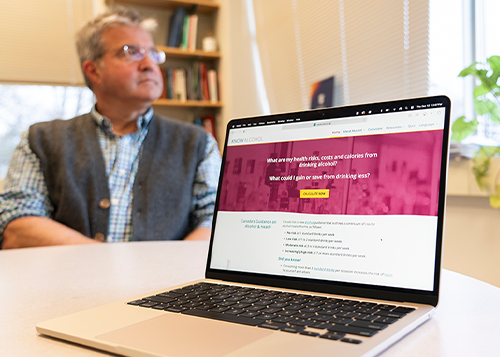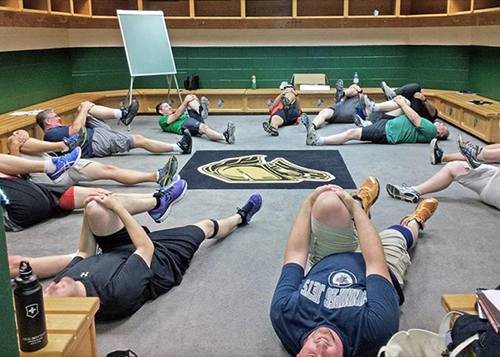Education
Our goal is to educate, develop and mentor future and current health practitioners, educators and researchers who can work together effectively to serve evolving health needs.
As a Faculty of Medicine, we have a fundamental responsibility to train people who can meet the health needs of individuals and society. This pillar encompasses all of our educational offerings—undergraduate and graduate degree programs, professional and postdoctoral training, faculty development, and continuing professional development—all of which focus on enabling learners to succeed in their careers and support health and well‑being wherever they choose to work and practise, in all corners of our province and around the world.
We must work with health system partners to identify emerging educational needs in human resource planning, and adapt our programs to meet those needs. This involves expanding the group of potential learners, domestically and internationally, including those who identify as part of historically, persistently, or systemically marginalized groups.
Across our educational offerings and services, we are committed to supporting and recognizing the patients, staff and educators in classroom, laboratory, clinical and community settings, who are all essential to achieving this goal and ultimately our vision.
Education Strategies
To best serve the needs of society, we must expand the diversity of our learner and prospective learner populations, and enhance the sense of belonging they experience in our programs.
Key to this is improving accessibility. We will identify and take active steps to address systemic barriers to increase inclusion of historically, persistently, or systemically marginalized groups by reviewing admissions processes, admissions requirements, and financial supports across programs. In addition, we will engage current learners from various locations, backgrounds and perspectives as ambassadors to proactively reach out to potential learners early in their educational journey and encourage them to consider health-related fields.
We recognize that increasing the diversity of our learner population is not enough. To enhance inclusion and support, we will create mentorship opportunities, in particular for learners who identify as members of underrepresented groups. In addition, we will ensure that services, including financial, academic and well-being services, are delivered based on the principles of equity so that all learners feel that they have access to the supports they need to succeed in achieving learning outcomes.
By taking concrete action to enhance diversity and inclusion in our programs and embedding cultural safety and humility in our curricula, we can play a pivotal role in eliminating racism and discrimination in the health-care system more broadly.
Staff and faculty are the foundation of our educational offerings and services, and achieving excellence in education must include supporting all team members by providing the tools, processes and training required to be effective and efficient, and to maintain well-being.
We will create and deliver staff and faculty development opportunities focused on adapting to change as a competency required to meet the evolving demands of delivering education with a continued focus on enabling the best possible learning outcomes.
In addition, we will design and implement approaches to managing and enabling clinical education in a way that honours the immense contributions of our clinical faculty, and minimizes process or system barriers that sometimes get in the way.
Finally, we will develop and deliver faculty training on practical ways to create culturally-safe, inclusive, and respectful learning environments in which creativity, empowerment and collaboration can thrive, resulting in better educational experiences for both our educators and our learners.
All of our educational offerings are designed to equip lifelong learners with the competencies required to engage in the health system workforce and serve society.
To enhance our capacity to achieve this, we will create a nimble, systematic approach to identifying evolving needs and addressing them through creation, expansion, regional distribution, realignment and renewal of educational offerings. This process will be informed by our partners, patients and society at large, and will use an evidence-based approach to evaluate and enrich our educational offerings in ways that improve learning outcomes.
For example, we will integrate into our programs important competencies that were emphasized by the COVID-19 pandemic including teamwork, the ability to embrace and adapt to change, advocacy and system analysis. In addition, we will strengthen learner skills in providing care and conducting research in ways that consider and support diversity and oppose racism and discrimination in all its forms.
We recognize innovation as essential to progress, and will strive to create a culture where we evaluate and learn from both our successes and our failures. Digital and virtual technologies have tremendous potential to further enhance education and access, and we will apply the lessons we have learned through the shift to remote and blended learning catalyzed by the pandemic in a systematic and deliberate way.
Beyond the use of technology, we will take an innovative approach to improving our inter-professional, team‑based and cross-sectoral education by testing innovative approaches to learning in person. This will enhance our learners’ ability to work in the health system, which is rapidly moving towards more collaborative, team-based models.
Finally, we will promote and cultivate creativity, innovation skills, and knowledge translation across disciplines so that we can use what we learn from educational research. It is through innovation that we can reach people in society whom we have not yet reached, accelerate the application of new findings to make a positive impact on people and populations, and create new ways of delivering care that result in better outcomes while minimizing negative impacts on the environment.
Our Education pillar in action

Seven Faculty of Medicine doctoral students named 2024 UBC Public Scholars

UBC welcomes health profession students to new training facility in Surrey
Building the Future: 2021–2026 is the refreshed strategic plan for UBC’s Faculty of Medicine.
Special thanks to all the faculty, staff, students and partners across the province who have contributed to the development of this plan.



